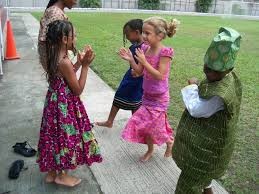
Learning through Play (The Game of Ten-Ten)
In Nigeria, many children (especially girls) grew up playing ten-ten. This was kind of the feet version of rock, paper, scissors.
Girls start playing as early as 5 years and boys who were courageous enough to ignore any suggestion of being sissy’s playing a girls game, joined in. The best challenges were boys against girls.
The objective of ten-ten was to get through a round without the opponent being able to match/predict your play. It was an intense, high energy game, usually very loud (and got kids in lots of trouble) but could be played by as little as 2 players to as many as 20!
Just thinking about this game, I realised it was a great example of learning through play. Ten-Ten taught us how to;
1, Build Interpersonal relationships: For most, it was an early introduction to teamwork. Though everyone wanted to be in the team with the masters, it was well understood that just one player really couldn’t carry an entire team. The best they could do was carry a round and strengthen the teams game. So there was always the jostle to fill the team with ‘masters’. Most girls spent lots of time leading to break time, negotiating for top players. Many practiced afterschool at the expense of completing home assignments to become a top-player!
2, Be Strategic: Many masters were known to be great strategist. Since they couldn’t possibly be mind readers, knowing which foot the opposing player was going to put forward, just had to be about strategy. From continuous play, many focused on understanding their opponents patterns and made a conscious effort to avoid being complacent and predictable. It seemed many of us are creatures of habit and are prone to repetition. In this case, playing the same feet patterns. Some went as far as suggesting there were physical behavioural give-aways the less skilled always show just a split second before a play. This made it easier to know which feet was going to be played.
3, Pivot: Now there is a thin line here between game-playing and cheating. Pivoting when done masterfully is an art of changing one’s mind without any evidence of cheating. It was all about speed! The masters had techniques for pivoting that suggested they spotted a giveaway and changed their play but at a speed that made it impossible to prove they knew what their opponent was going to do before changing. Pivoting required such intense speed that when played amongst masters, the crowd could only stand and watch in awe. Pivoting in business is like insider information or market intelligence that is swiftly used to one’s advantage. But in both cases, can only work if there’s no paper trail and foul play can’t be proven!
4. Apply Sight-Sound-Intuition: This is one game that rewards only based on how well you applied multiple senses. The less senses you engaged, the less effective you were. The most applied sense was sight (you could never take your eyes off your opponent), sound (the rhythmic clapping and stamping of feet determined speed and play. Missing a beat in a fraction of a second makes a player vulnerable to skilled players). Of course, intuition goes without saying.
5. Skip count: The game was an informal introduction to skip counting, which lays an essential mathematical foundation and is key in developing strategies used to solve addition, subtraction, multiplication and division. At the end of the day, this was probably the most fun way to learn to count in tens where each round was played with a chant as follows;
Ten, ten..ten, ten…ten…ten (clap rhythm)…PLAY
Twenty….twenty…twenty…(clap rhythm)…PLAY
Thirty….thirty….thirty….(clap rhythm)…PLAY
And a full round ended at 100!
Happy Play!
Personal Finance Mentor | Int’l Business Scholar | Erudite Academic | 2020 Paul R. Lawrence Fellow USA | I help individuals achieve FIRE "financial independence, retire early" | Keynote Speaker | Empowered 20,000+ lives
3ySuch a wonderful piece Mofope. Interesting to see the perspective and what could be learnt from such a "simple" childhood pastime. Well done!!